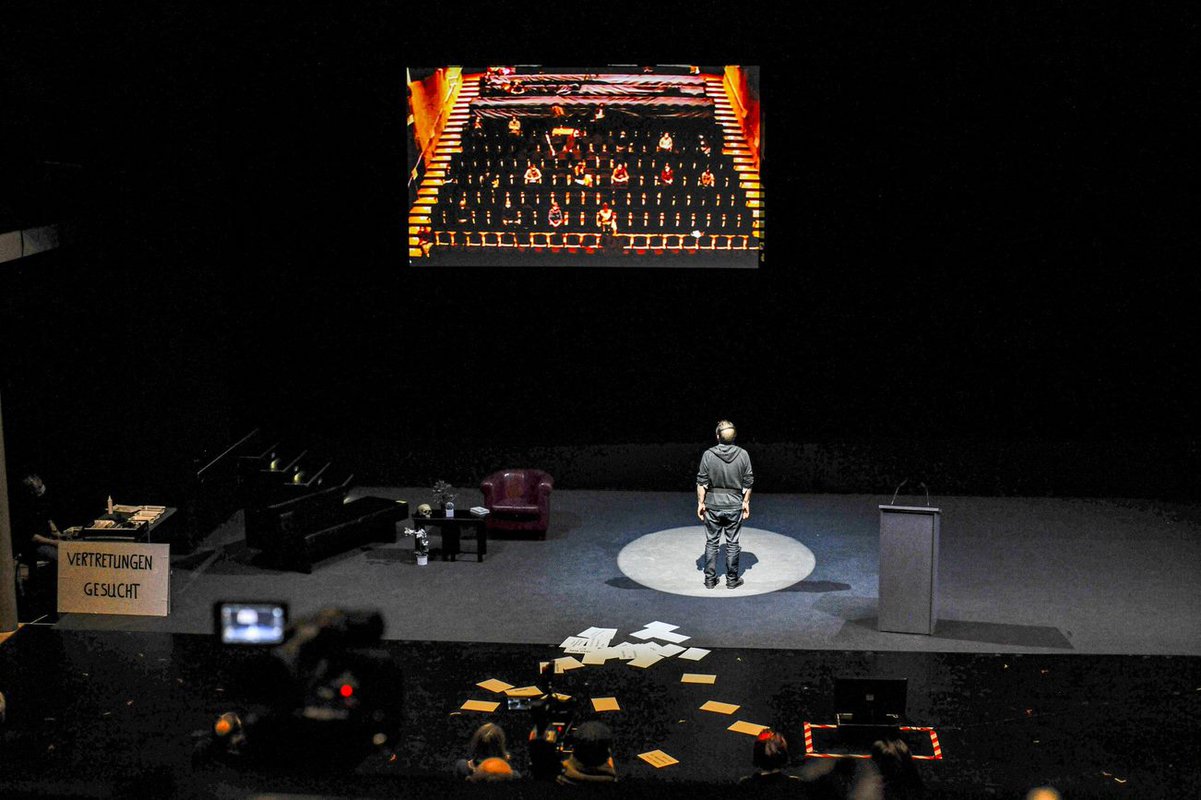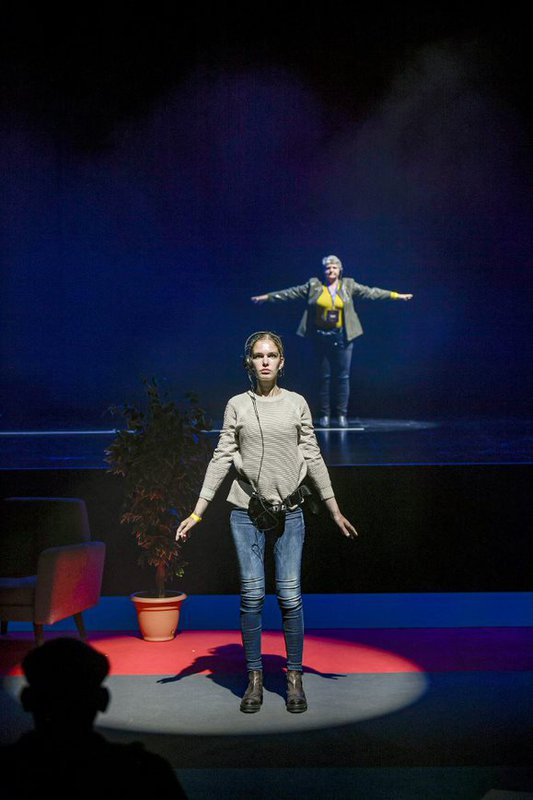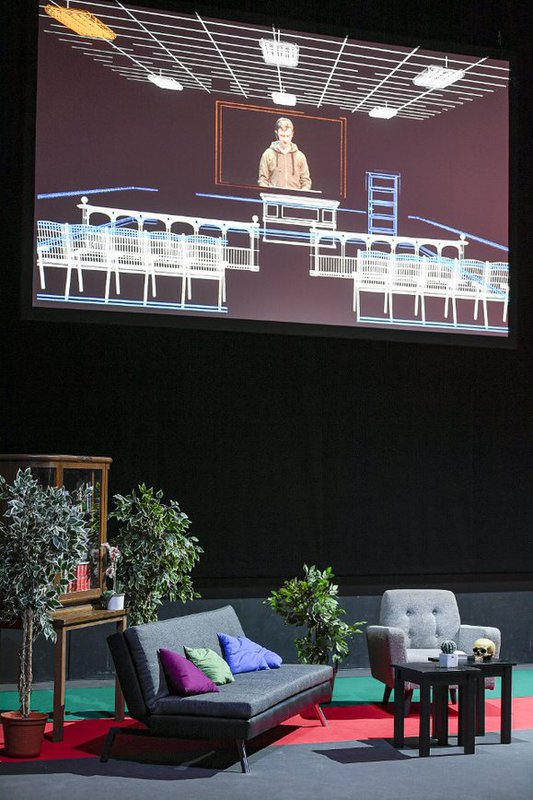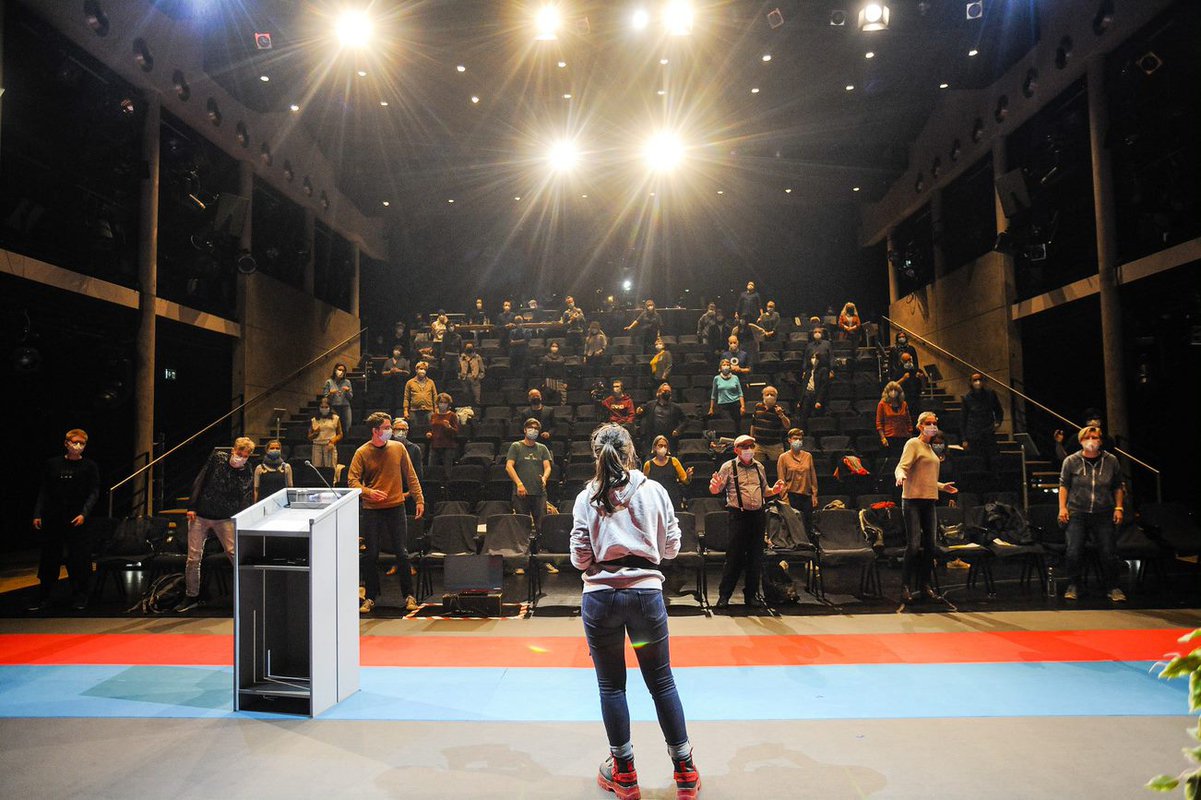Theatre
Concept, Text and Direction: Helgard Haug, Stefan Kaegi, Daniel Wetzel | Lighting and Video Design: Marc Jungreithmeier | Sound Design: Daniel Dorsch | Dramaturgy and Research: Imanuel Schipper and Lüder Pit Wilcke | Lead Voice: Nadja Stübiger | Supporting Voices: Henriette Hölzel, David Kosel, Hans-Werner Leupelt and Karina Plachetka| Political/Cultural/Educational Cooperation: Dr. Werner Friedrichs | Production Manager: Epona Hamdan | Assistant Dramaturge: Sebastian Klauke | Assistant Director: Lisa Homburger and Maximilian Pellert | Stage Assistant: Maksim Chernykh | Production Assistant: Federico Schwindt | Production by: Rimini Protokoll | In Co-Production with: Staatsschauspiel Dresden, Ruhrfestspiele Recklinghausen, HAU Hebbel am Ufer Berlin and Goethe-Institut | The concept creation was funded by: Federal Agency for Civic Education
Stefan Kaegi
Director
Director de teatro documental y productor suizo-alemán
Stefan Kaegi is a Swiss-German documentary theater director and producer, who in 2000 co-founded the collective “Rimini Protokoll” along with Helgard Haug and Daniel Wetzel. He also collaborated on several projects with Argentinian writer and theater director Lola Arias, including Ciudades Paralelas, a "portable festival" focused on urban interventions.
Stefan’s approach to theater is non-traditional: his plays are characterized by representing reality in unconventional scenarios, such as the streets, a bus, or a public building, approaching performance and creating complex theatrical experiences.
Helgard Haug
Co-dirección
Author and director, Helgard Haug is one of the founders of the Swiss-German collective Rimini Protokoll. She has received multiple awards for her avant-garde approach to theater. With plays such as Deadline (2004), Wallenstein (2006), Situation Rooms (2013) and Chinchilla Arsehole eyeye (2020), she is also known for her work as a juror and professor, having taught at the Ruhr University Bochum, the Danish School of Performing Arts, the Zurich University of the Arts, the University of Hawaii, the Iuav University of Venice and the University of Berlin, among others.
Daniel Wetzel
Director
Daniel Wetzel has studies in Applied Theater and is a founder, director and member of the Rimini Protokoll collective. He has developed projects that explore in the fields of audio, film and installation, seeking to create new visions of the reality that surrounds us. Since the 1990s, his work is described as a pioneer in opening new forms of documentary theater, highlighting Shooting Bourbaki (2003), Karl Marx: Capital, Volume One (2007), Quality Control (2014), among others.
Rimini Protokoll
The company
A Swiss-German theater collective formed by Stefan Kaegi, Helgard Haug and Daniel Wetzel. Since their first encounter in the early 2000s, the trio has made its mark by exploring the concept of reality and approaching its dimensions from unusual perspectives. Their projects mix theater, urban intervention and performance. The place they currently call home is Berlin's renowned Theater Hebbel am Ufer (HAU). Rimini Protokoll has been described as the "protagonist and founder" of a new way of understanding and approaching reality through theater, strongly influencing the young theater scene.
The company has already been part of Teatro a Mil with several performances, such as Remote Santiago, Granma: Metales de Cuba, Uncanny Valley among others.
- Because the viewer takes an unusual participatory position, embodying an expert on climate change and highlighting the doubts and/or misgivings that may exist behind the positions and knowledge of these characters. The German media Deutsche Welle emphasized this aspect in an article about the play in the framework of the Ruhrfestspiele Theater Festival.
- Because it is a production by Rimini Protokoll, a collective characterized by immersing the audience in an interactive experience. In general, their plays mix technology and questionings on different current issues, always playing with the boundaries of theatrical language. They are widely recognized as exponents of "immersive theater", as Raquel Vidales of El País (Spain) states.
- Learn more about this play, its protagonists and origin, opening this link: Conference of the Absente: Cooperation and Collectivity.
On Instagram @rimini_protokoll
On Facebook facebook.com/riminiprotokoll
On Vimeo vimeo.com/riminiprotokoll
Website: rimini-protokoll.de
COLABORA




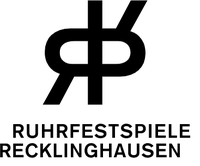

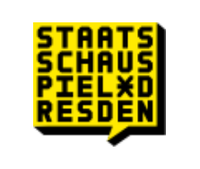
Conferencia de los ausentes
A production of Rimini Protokol collective
- Germany
- Switzerland
- Spanish
- 120 minutes
- + 14 years
A theatre performance camouflaged as an international conference, in which some spectators help to save carbon-emissions by enacting experts from different countries.
In times of global action against climate change, where International Cooperation takes a leading role, this play by the prominent Swiss-German collective Rimini Protokoll puts the audience at the center of the debate: it places them in the shoes of a speakers who talk about absence in terms of resources, phantom-pain, legal defence, collective memory and other global topics.
Hence, volunteers are transformed into experts from different parts of the world. They lend their bodies and voices to people from far away with the help of a sophisticated technical setup.
Using the setting of performative theater techniques, this participatory proposal puts into play several contradictory theses on the consequences of globalization, by turning people into bearers of ideas, biographies and several experts’ thoughts.
Conference of the Absent thus becomes a collective game that can be recreated at each performance.
Conferencia de los ausentes
A production of Rimini Protokol collective
- Germany
- Switzerland
- Spanish
- 120 minutes
- + 14 years
A theatre performance camouflaged as an international conference, in which some spectators help to save carbon-emissions by enacting experts from different countries.
In times of global action against climate change, where International Cooperation takes a leading role, this play by the prominent Swiss-German collective Rimini Protokoll puts the audience at the center of the debate: it places them in the shoes of a speakers who talk about absence in terms of resources, phantom-pain, legal defence, collective memory and other global topics.
Hence, volunteers are transformed into experts from different parts of the world. They lend their bodies and voices to people from far away with the help of a sophisticated technical setup.
Using the setting of performative theater techniques, this participatory proposal puts into play several contradictory theses on the consequences of globalization, by turning people into bearers of ideas, biographies and several experts’ thoughts.
Conference of the Absent thus becomes a collective game that can be recreated at each performance.
Concept, Text and Direction: Helgard Haug, Stefan Kaegi, Daniel Wetzel | Lighting and Video Design: Marc Jungreithmeier | Sound Design: Daniel Dorsch | Dramaturgy and Research: Imanuel Schipper and Lüder Pit Wilcke | Lead Voice: Nadja Stübiger | Supporting Voices: Henriette Hölzel, David Kosel, Hans-Werner Leupelt and Karina Plachetka| Political/Cultural/Educational Cooperation: Dr. Werner Friedrichs | Production Manager: Epona Hamdan | Assistant Dramaturge: Sebastian Klauke | Assistant Director: Lisa Homburger and Maximilian Pellert | Stage Assistant: Maksim Chernykh | Production Assistant: Federico Schwindt | Production by: Rimini Protokoll | In Co-Production with: Staatsschauspiel Dresden, Ruhrfestspiele Recklinghausen, HAU Hebbel am Ufer Berlin and Goethe-Institut | The concept creation was funded by: Federal Agency for Civic Education
Stefan Kaegi
Director
Director de teatro documental y productor suizo-alemán
Stefan Kaegi is a Swiss-German documentary theater director and producer, who in 2000 co-founded the collective “Rimini Protokoll” along with Helgard Haug and Daniel Wetzel. He also collaborated on several projects with Argentinian writer and theater director Lola Arias, including Ciudades Paralelas, a "portable festival" focused on urban interventions.
Stefan’s approach to theater is non-traditional: his plays are characterized by representing reality in unconventional scenarios, such as the streets, a bus, or a public building, approaching performance and creating complex theatrical experiences.
Helgard Haug
Co-dirección
Author and director, Helgard Haug is one of the founders of the Swiss-German collective Rimini Protokoll. She has received multiple awards for her avant-garde approach to theater. With plays such as Deadline (2004), Wallenstein (2006), Situation Rooms (2013) and Chinchilla Arsehole eyeye (2020), she is also known for her work as a juror and professor, having taught at the Ruhr University Bochum, the Danish School of Performing Arts, the Zurich University of the Arts, the University of Hawaii, the Iuav University of Venice and the University of Berlin, among others.
Daniel Wetzel
Director
Daniel Wetzel has studies in Applied Theater and is a founder, director and member of the Rimini Protokoll collective. He has developed projects that explore in the fields of audio, film and installation, seeking to create new visions of the reality that surrounds us. Since the 1990s, his work is described as a pioneer in opening new forms of documentary theater, highlighting Shooting Bourbaki (2003), Karl Marx: Capital, Volume One (2007), Quality Control (2014), among others.
Rimini Protokoll
The company
A Swiss-German theater collective formed by Stefan Kaegi, Helgard Haug and Daniel Wetzel. Since their first encounter in the early 2000s, the trio has made its mark by exploring the concept of reality and approaching its dimensions from unusual perspectives. Their projects mix theater, urban intervention and performance. The place they currently call home is Berlin's renowned Theater Hebbel am Ufer (HAU). Rimini Protokoll has been described as the "protagonist and founder" of a new way of understanding and approaching reality through theater, strongly influencing the young theater scene.
The company has already been part of Teatro a Mil with several performances, such as Remote Santiago, Granma: Metales de Cuba, Uncanny Valley among others.
- Because the viewer takes an unusual participatory position, embodying an expert on climate change and highlighting the doubts and/or misgivings that may exist behind the positions and knowledge of these characters. The German media Deutsche Welle emphasized this aspect in an article about the play in the framework of the Ruhrfestspiele Theater Festival.
- Because it is a production by Rimini Protokoll, a collective characterized by immersing the audience in an interactive experience. In general, their plays mix technology and questionings on different current issues, always playing with the boundaries of theatrical language. They are widely recognized as exponents of "immersive theater", as Raquel Vidales of El País (Spain) states.
- Learn more about this play, its protagonists and origin, opening this link: Conference of the Absente: Cooperation and Collectivity.
On Instagram @rimini_protokoll
On Facebook facebook.com/riminiprotokoll
On Vimeo vimeo.com/riminiprotokoll
Website: rimini-protokoll.de
COLABORA







